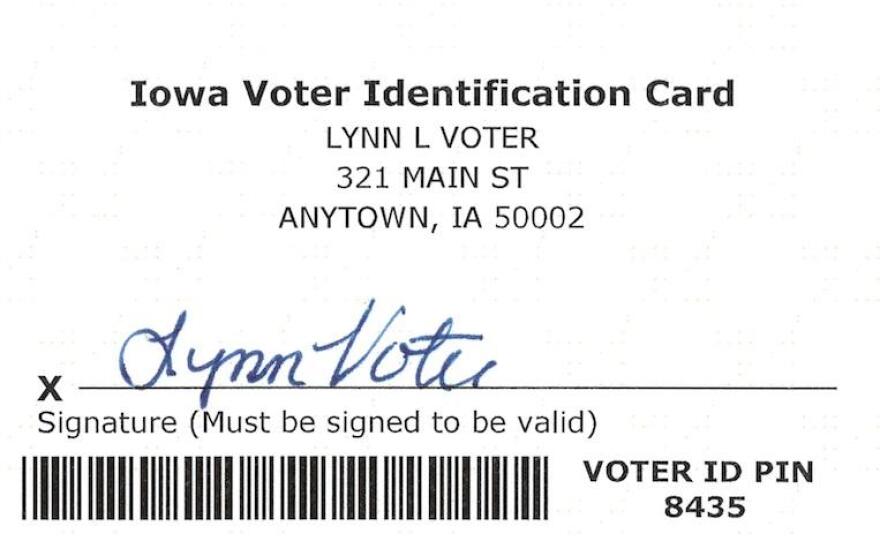Iowans can vote in this fall's midterm election for U.S. Senate, members of Congress, governor, state lawmakers, and more. It's the first major election since Republicans in the Iowa Legislature passed sweeping voting law changes last year that shortened the time allowed for voting by mail, voting early in person, and voting in person on Election Day.
Iowa’s early voting period now begins 20 days before Election Day. This year, Oct. 19 is the day Iowans can start voting in person at their county auditor's office. It’s also the day county auditors start mailing absentee ballots to voters who requested them. Early in-person voting continues until 5:00 p.m. on Monday, Nov. 7.
Find more details here about getting registered to vote and updating your registration if you’ve moved.Voting early in person
Every county auditor's office will be open for in-person early voting Oct. 19 through Nov. 7. Additional early voting locations may be available in your county, and you can find more information on your county auditor’s website or social media, or by calling their office. Find your county auditor here.

Iowa has a voter ID law. Bring one of these to vote:
- Iowa Driver’s License
- Iowa Non-Operator ID
- Iowa Voter Identification Card (request one from your county auditor if you need it)
- Military ID or Veteran ID
- U.S. Passport
- Tribal ID Card/Document
If your voter registration is updated with your current address, your ID does not have to reflect your current address. If you don’t have any of these forms of ID when you go to vote early in person or on Election Day, you can bring Election Day registration documents or have another voter registered in the precinct attest to your identity. If you don’t have any of those with you, you can vote a provisional ballot and come back later to provide ID or necessary documents to get your ballot counted.
Iowans can register to vote online, at their county auditor's office or other early voting location, or at their polling place on Election Day.Voting by mail
To vote by mail, you have to request a ballot. Your ballot request form must be received by your county auditor by 5 p.m. on Monday, Oct. 24. But election officials recommend requesting a ballot far ahead of that deadline to allow enough time for the ballot to arrive in the mail. Find detailed information about requesting a ballot here.
When you receive a ballot from your county auditor after they start getting mailed out Oct. 19, follow all the instructions that come with the ballot to make sure your vote is counted. Be sure to seal the outer envelope and sign it.
You can mail your voted ballot back to your county auditor. The ballot must be received by your county auditor by 8 p.m. on Election Day, Nov. 8, in order to get counted. This is a major difference from past elections. Uniformed and overseas citizens and people in the state address confidentiality program have a different deadline for voting by mail.
Voters may also choose to deliver their ballot to their county elections office. The ballot must be received by your county auditor by 8 p.m. on Election Day, Nov. 8. Some counties have a ballot drop box outside their elections office.
You can check the secretary of state’s website to see what date your ballot is mailed to you, and what date it’s received by your county auditor.
Iowa has new rules for who can help a voter return their absentee ballot. Previously, any voter could designate anyone else to return their absentee ballot for them. Now, the only people who can deliver an absentee ballot other than the voter are someone living in the voter’s household, an immediate family member, and the election officials who deliver a ballot to a resident of a health care facility or hospital. They can deliver the ballot to the county auditor’s office or the ballot drop box outside the office if available.
If one of those options is not available to a voter who is unable to return their own ballot because of blindness or other disability, they can ask someone else to be a "delivery agent" and return their ballot. The "delivery agent" must be a registered voter in Iowa and cannot be the voter’s employer, an officer of the voter’s union, or an actual or implied agent for a political party, candidate or committee. The voter must complete and sign a designation form. The “delivery agent” must deliver the ballot in person to the county auditor’s office along with the form, and must show their own identification and sign a statement that they’ve complied with the law. The delivery agent is not allowed to use the ballot drop box or the mail to return the ballot. The delivery agent must provide the voter with a receipt and cannot deliver more than two absentee ballots per election.
Voting in person on Election Day, Nov. 8, is also an option. Polls will be open from 7 a.m. to 8 p.m. Click here to find your polling place. Your polling place may have changed because of redistricting.
The Iowa State Association of County Auditors compiled this summary of some of the changes to Iowa's voting laws.
The Iowa Secretary of State's office has also compiled voting resources here.






